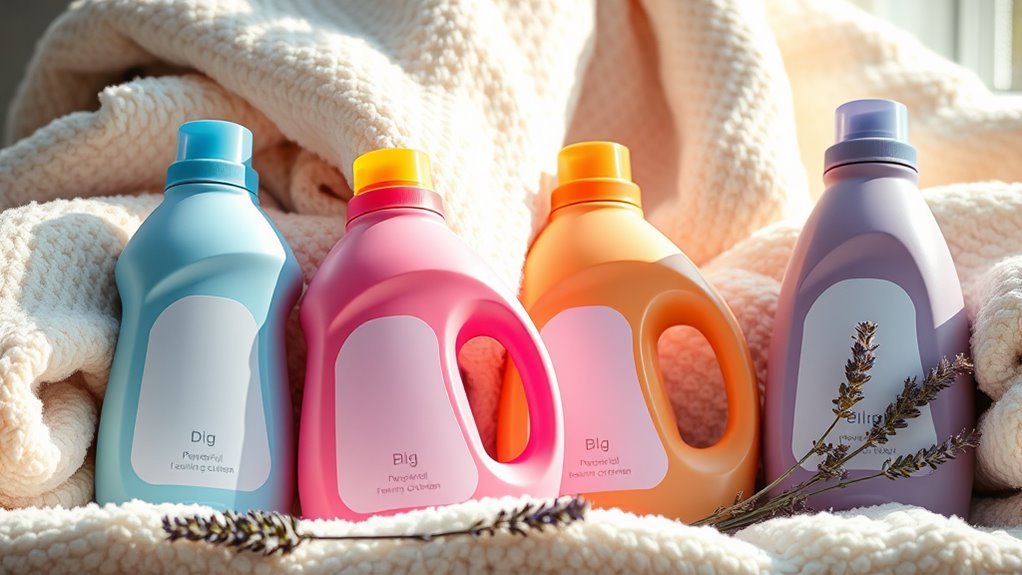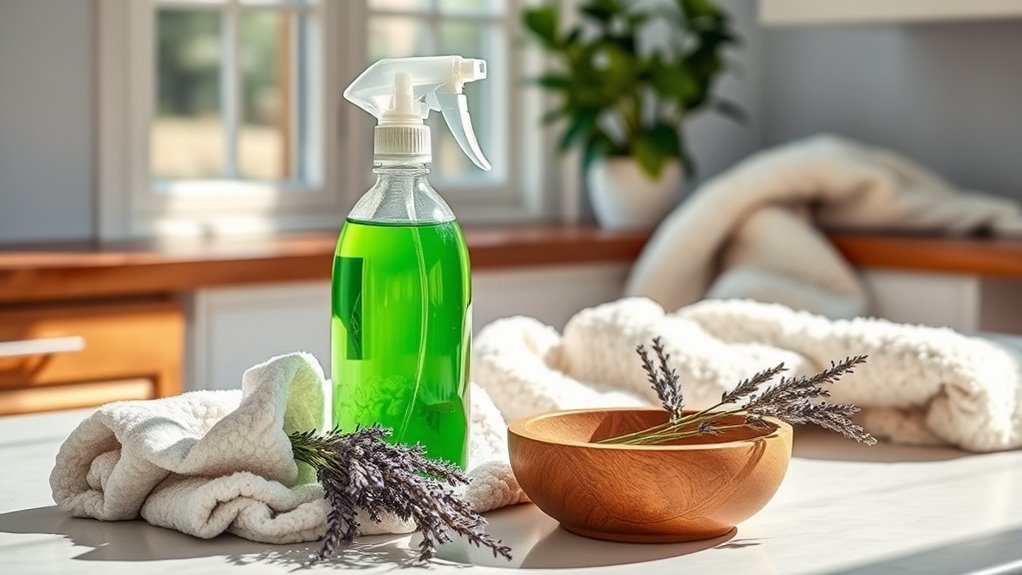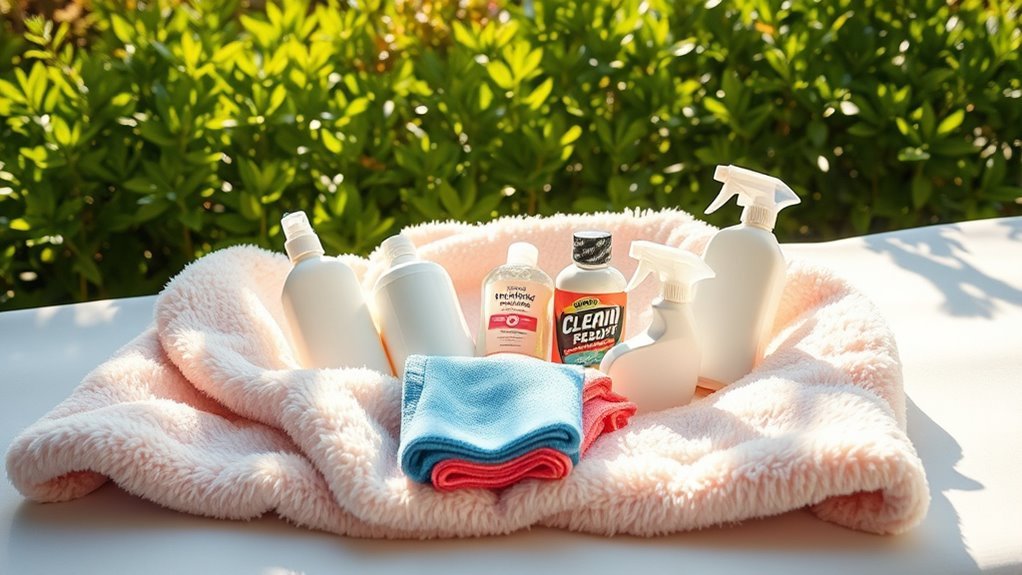Best Products to Clean Your Blanket
You’ll want gentle, hypoallergenic detergents that dissolve well in cold water to protect your blanket’s fibers. For stains, enzyme-based removers or pre-treatment sprays work best, especially if applied quickly. To keep softness, choose fabric softeners free from heavy chemicals and try light fabric fresheners that won’t damage your blanket. Natural options like vinegar and baking soda are gentle alternatives if you prefer eco-friendly care. There are also specialty cleaners if you have delicate or wool blankets to take into account. Explore how to keep your blankets fresh and cozy for longer.
Top Detergents for Blanket Cleaning

When you’re looking to keep your blankets fresh and soft, choosing the right detergent is crucial. The best laundry detergents for blankets often feature gentle yet effective detergent formulas designed to preserve fabric integrity while removing dirt. You want a detergent free from harsh chemicals and dyes that can degrade fibers or cause skin irritation. Look for options labeled hypoallergenic or formulated specifically for delicate fabrics. Powder, liquid, or pod forms all work well, but liquid detergents tend to dissolve better in cold water, which helps protect blanket fibers. Avoid detergents with heavy fragrances; instead, opt for those that offer a subtle scent or are fragrance-free. By selecting the right detergent formula, you make certain your blankets stay cozy, clean, and long-lasting without compromising your freedom to enjoy comfort.
Effective Stain Removers for Blankets
When tackling stains on your blanket, choosing the right remover is key, whether you prefer natural solutions like baking soda or chemical options designed for tough spots. You’ll want to evaluate the type of stain and fabric before applying, as this affects which product works best and how you use it. Applying stain removers promptly and following the instructions carefully can make all the difference in restoring your blanket’s look.
Types of Stain Removers
Although stains on blankets can be stubborn, choosing the right type of stain remover can make a significant difference in restoring your blanket’s appearance. You’ll find enzyme cleaners especially effective for protein-based stains like sweat or food; they break down stain molecules, making removal easier. Pre-treatment sprays are another practical option—they penetrate stains before washing, boosting your blanket’s cleanliness without harsh scrubbing. When selecting a stain remover, consider the fabric type and stain origin to pick a product that targets the issue without damaging fibers. Using these tools correctly gives you the freedom to extend your blanket’s life and keep it looking fresh. Remember, the right stain remover isn’t just about cleaning—it’s about preserving comfort and quality.
Natural Vs Chemical Options
Choosing between natural and chemical stain removers for your blanket depends largely on your priorities for safety, effectiveness, and environmental impact. Natural benefits include gentler ingredients like vinegar, baking soda, and lemon juice that reduce risk of skin irritation and lower environmental harm. These options allow you to clean effectively while maintaining freedom from harsh toxins. On the other hand, chemical stain removers often promise quicker, stronger action on tough stains but come with chemical drawbacks such as potential fabric damage, allergic reactions, and pollution concerns. If you want powerful results but prefer to avoid synthetic substances, natural methods provide a safe alternative. Ultimately, balancing these factors helps you choose a stain remover that aligns with your values and keeps your blanket fresh without compromising your health or the planet.
Application Tips for Effectiveness
To get the best results from your stain remover, you’ll want to treat stains as soon as possible before they set into the fibers. Start by gently blotting the stain—never rub—to avoid pushing it deeper. Apply the remover directly onto the spot, letting it sit for the recommended time. Using the right cleaning techniques, like pre-soaking delicate blankets, can enhance stain removal without damaging fabric. Always check care labels to match stain removal with washing frequency; over-washing can wear fibers, while under-washing lets stains settle. After treating, wash your blanket in cool water with a gentle cycle to preserve texture and color. By combining prompt action with mindful cleaning techniques and appropriate washing frequency, you’ll keep your blankets fresh and stain-free, giving you the freedom to enjoy them longer.
Best Fabric Softeners to Maintain Blanket Softness
When you want to keep your blanket feeling luxuriously soft after every wash, using the right fabric softener is crucial. Look for softeners specifically designed to enhance fabric softness without leaving residue that can stiffen fibers over time. Products with long-lasting scent retention add a fresh, comforting aroma that lingers, making your blanket even more inviting. Opt for formulas that penetrate deeply to maintain softness while protecting the blanket’s integrity. Avoid heavy chemical softeners if you prefer a lighter touch; instead, choose options that balance softness and breathability. By selecting a fabric softener tailored to your blanket’s material, you guarantee it stays cozy and pleasant, giving you the freedom to relax wrapped in comfort every day.
Natural and Eco-Friendly Blanket Cleaning Products

If you’re looking to keep your blankets clean without harsh chemicals, plant-based cleaning agents offer a gentle yet effective option. Choosing biodegradable detergents not only protects your fabrics but also reduces environmental impact. Adding a few drops of essential oils can naturally boost freshness while keeping your blanket soft and inviting.
Plant-Based Cleaning Agents
Although you might be tempted to reach for conventional detergents, plant-based cleaning agents offer a safer, eco-friendly alternative for keeping your blankets fresh and clean. These products harness plant based benefits like natural enzymes and surfactants derived from coconut, corn, or sugarcane, which effectively break down dirt without harsh chemicals. Choosing eco friendly alternatives means you’re reducing exposure to synthetic fragrances and toxins, protecting both your health and the environment. Plus, plant-based agents are often biodegradable and gentler on delicate fabrics, preserving your blanket’s softness and longevity. When shopping, look for labels highlighting renewable ingredients and certifications ensuring sustainability. By opting for plant-based cleaners, you’re embracing a practical, responsible way to maintain your blankets while supporting a greener lifestyle.
Biodegradable Detergent Options
Since blankets require gentle care, choosing biodegradable detergents guarantees you’re using products that effectively clean without harming the environment. You’ll want to look for eco friendly brands that prioritize natural ingredients, free from harsh chemicals and synthetic fragrances. These detergents break down quickly, minimizing water pollution, so your blanket stays fresh while you support sustainability. Pay attention to sustainable packaging as well—options like recycled materials or refillable containers reduce waste and align with your eco-conscious values. When selecting a biodegradable detergent, make sure it’s compatible with your blanket’s fabric to prevent damage. By choosing these thoughtful products, you maintain your blanket’s softness and longevity, all while contributing to a healthier planet. It’s a practical, responsible choice that gives you freedom to care without compromise.
Essential Oils for Freshness
A few drops of essential oils can transform your blanket care routine by adding natural vitality without relying on synthetic fragrances. Lavender oil and eucalyptus oil are popular choices that not only scent your blanket but also offer antibacterial benefits. You can add them to your wash cycle or dilute with water for a gentle spray. Here’s a quick guide to help you pick the right oil for your needs:
| Essential Oil | Benefits | Usage Tips |
|---|---|---|
| Lavender Oil | Calming scent, antibacterial | Add 3-5 drops to detergent |
| Eucalyptus Oil | Revitalizing, natural deodorizer | Dilute for fabric spray |
| Peppermint Oil | Invigorating, insect repellent | Combine with water in spray bottle |
Using essential oils lets you maintain a fresh blanket while staying eco-friendly and free from harsh chemicals.
Specialty Cleaners for Delicate and Wool Blankets

When caring for delicate and wool blankets, you’ll want to choose specialty cleaners designed to protect their fibers while effectively removing dirt and odors. Using the right cleaning techniques guarantees your blankets stay soft and durable without shrinking or felting. Here are some top product recommendations to take into account:
- Woolite Delicates: Gentle formula perfect for hand or machine wash, preserving wool’s natural texture.
- The Laundress Wool & Cashmere Shampoo: A concentrated cleaner that maintains fiber strength and vibrancy.
- Eucalan Fine Fabric Wash: No-rinse formula with lanolin, ideal for delicate fibers and natural softness.
Tips for Using Fabric Fresheners on Blankets
Taking care of your blankets goes beyond just washing them with the right cleaners; keeping them smelling fresh between washes is equally important. Using fabric fresheners effectively can help with blanket odor elimination and maintain that cozy feeling. Here are practical fabric freshening techniques to try:
| Tip | Description |
|---|---|
| Test first | Spray a small area to avoid damage or stains |
| Use light sprays | Avoid soaking; a light mist is enough |
| Air dry | Let blankets dry completely to prevent mildew |
| Target odors | Focus on areas prone to smells, like edges |
| Combine methods | Use fresheners alongside regular washing |
Frequently Asked Questions
How Often Should I Wash My Blanket?
Think of your blanket care like tuning a guitar—it needs regular attention to stay fresh and comfortable. You should wash your blanket about every one to three months, depending on use and exposure to dirt or allergens. Adjust washing frequency if you have pets or allergies. Keeping a consistent schedule guarantees your blanket stays clean and cozy, giving you the freedom to relax without worrying about hidden grime or odors.
Can I Use Hot Water to Clean All Types of Blankets?
You can’t always use hot water to clean all blanket types because it might damage delicate fabrics like wool or fleece. Hot water works well for cotton or synthetic blankets, helping to kill germs and remove stains. Always check your blanket’s care label first. If it says cold or warm water only, stick to that to avoid shrinking or weakening fibers. Knowing your blanket type lets you clean it safely and keep it cozy longer.
What Is the Best Method to Dry Blankets Without Damage?
You might worry that air drying takes too long, but it’s the gentlest way to keep your blanket safe from damage and preserve its softness. If you’re short on time, tumble drying on a low heat setting works well, just toss in a few clean tennis balls to keep fluffiness. Avoid high heat to prevent shrinking or weakening fibers. This balance lets you enjoy freedom from worry while caring for your blanket.
Are There Any Health Benefits to Regularly Cleaning Blankets?
Regularly cleaning your blankets offers real health benefits. You’ll reduce allergens like dust mites, which helps with allergy reduction and keeps your breathing easier. Plus, washing eliminates bacteria and other germs that can accumulate over time, protecting you from potential infections. Keeping your blankets fresh isn’t just about comfort—it’s a practical step to maintain a healthier sleeping environment, giving you the freedom to rest without worry.
How Do I Store Blankets to Keep Them Fresh Between Washes?
Did you know that over 60% of people say their blankets develop odors within a week? To keep your blankets fresh between washes, focus on proper blanket storage. Use breathable cotton bags or linen storage bins to prevent moisture buildup. Add lavender sachets or cedar blocks for natural freshness. Avoid plastic bags, as they trap humidity and cause mustiness. These freshness tips help your blankets stay clean, comfy, and ready whenever you want freedom from laundry stress.






